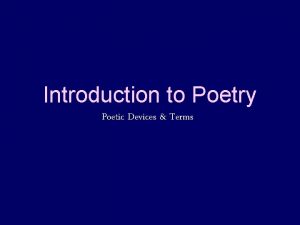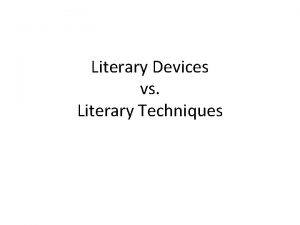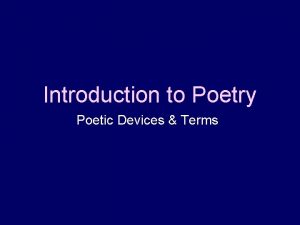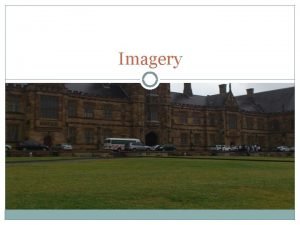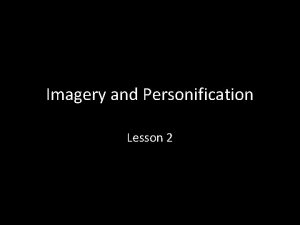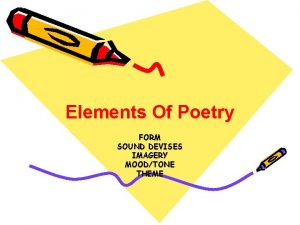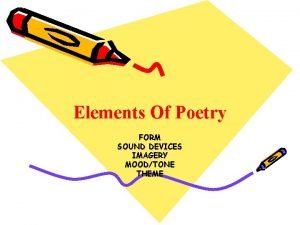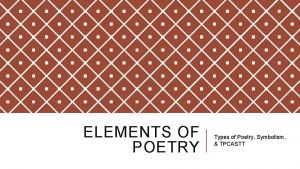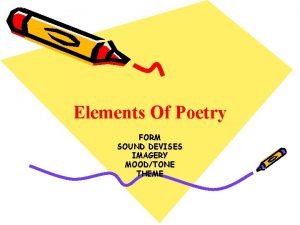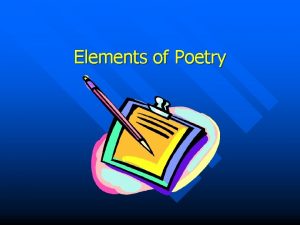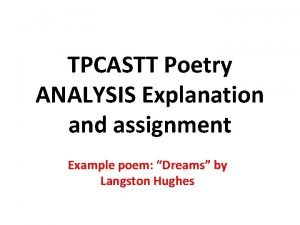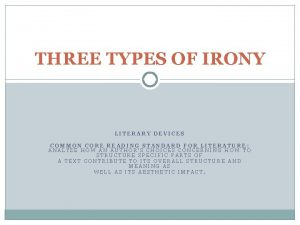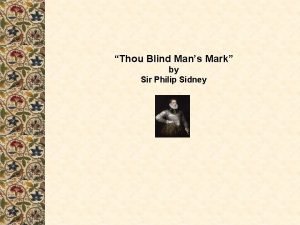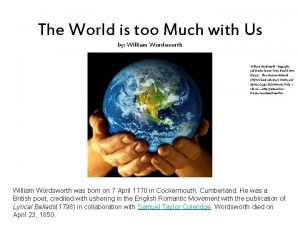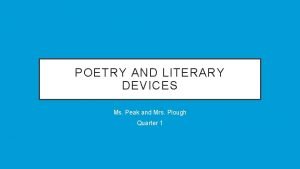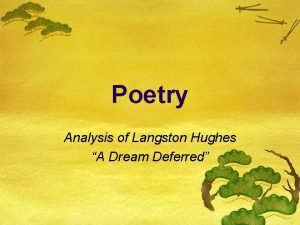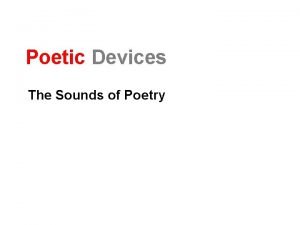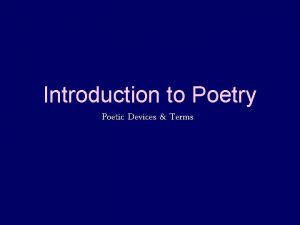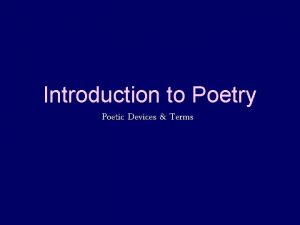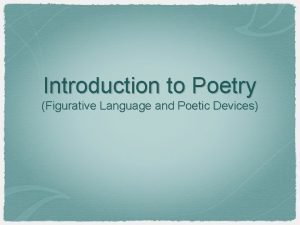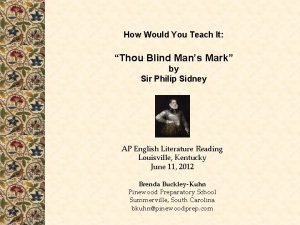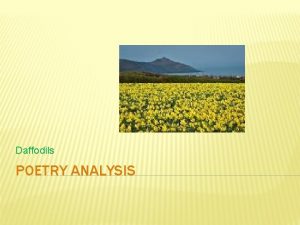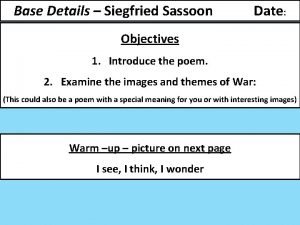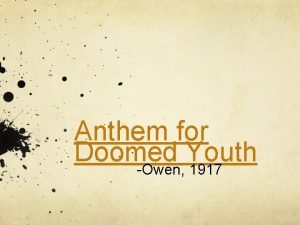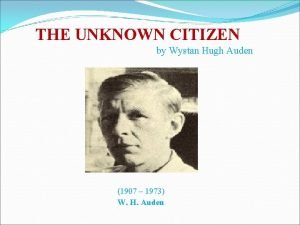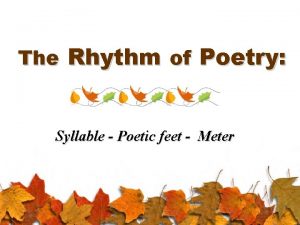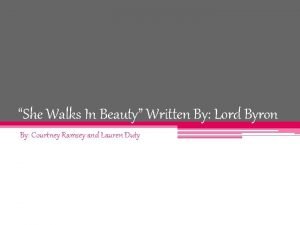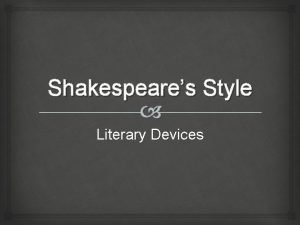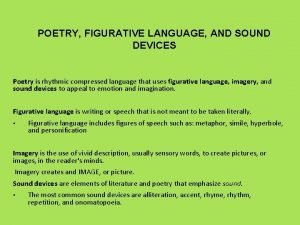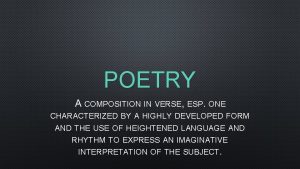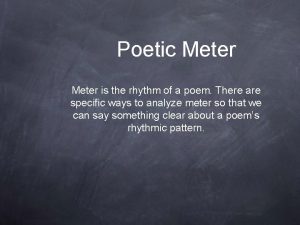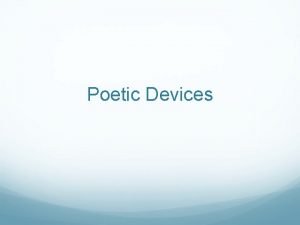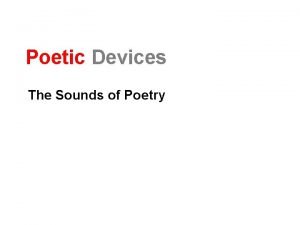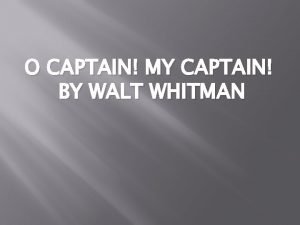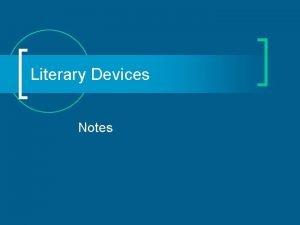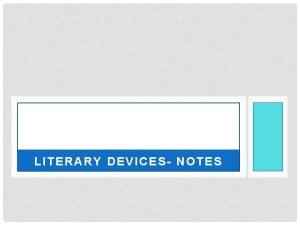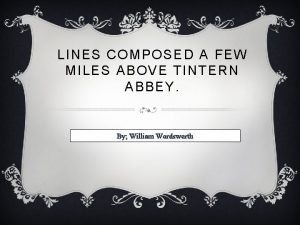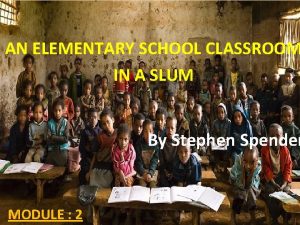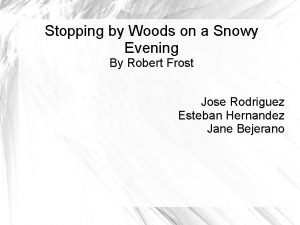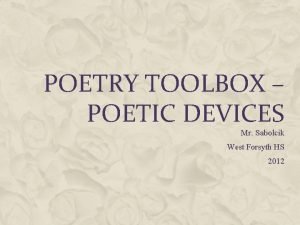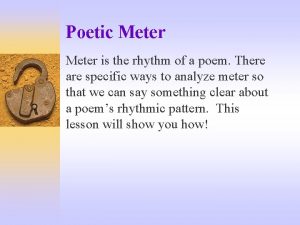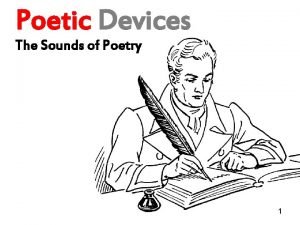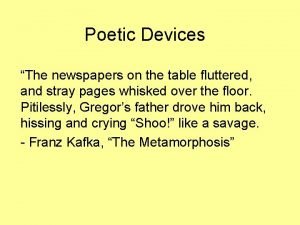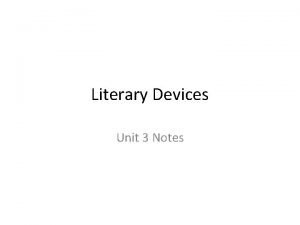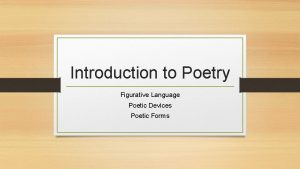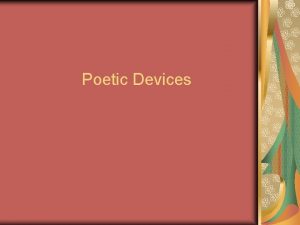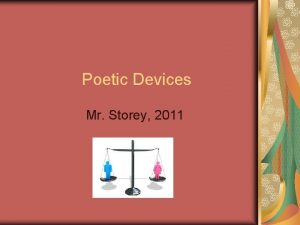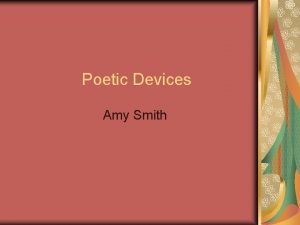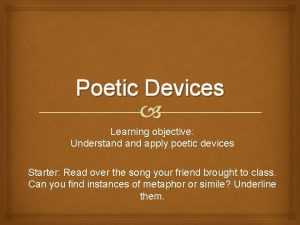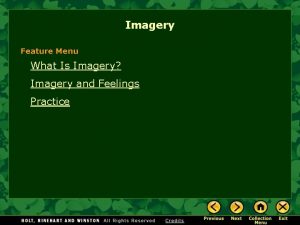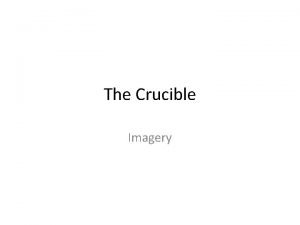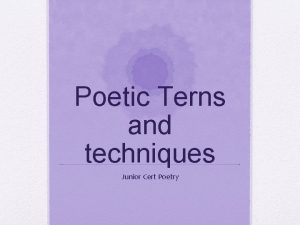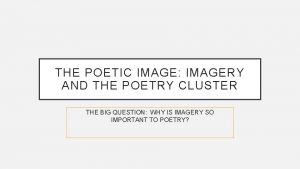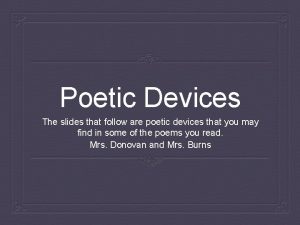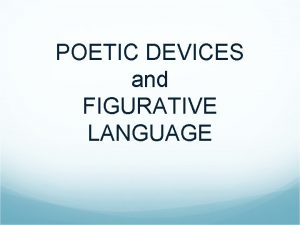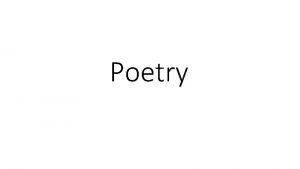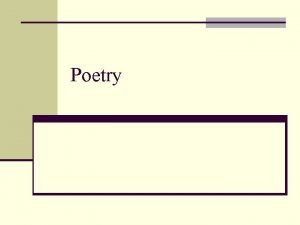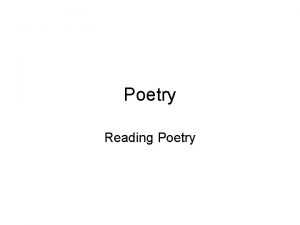Poetic Devices Introduction to Poetry Unit Imagery Devices






























































- Slides: 62

Poetic Devices Introduction to Poetry Unit

Imagery Devices Purpose is to create an image in the reader’s mind ● Simile ● Metaphor ● Personification

Simile A comparison of two things using the words like or as

Examples of a Simile ● Bob is hungry as a wolf. o Bob and wolf are the two things being compared using “as” ● Sue smells like a rose. o Sue and rose are the two things being compared using “like” ● Michael is as fine as chocolate syrup on ice cream. o Michael and syrup are the two things being compared using “as”

Metaphor A comparison of two unlike things without using like or as.

Examples of Metaphor ● Bob is a hungry wolf. o Bob is compared to a wolf. ● Sue is a rose, filling the room with her sweet scent. o Sue (or Sue’s scent) and rose (or the rose’s scent) are being compared ● My sister is such a witch. o Sister is compared to a witch.

Personification A type of metaphor in which non-human things or ideas possess human qualities or actions

Examples of Personification ● The wind whispered her name. o Wind is being personified: “wind whispered”, because “wind” can’t actually “whisper. ” ● Love is blind. Love is being personified because love has no eyes that could be blinded. o Note: If something had eyes, saying it is “blind” is NOT personification. o

Sound Devices Purpose is to create a rhythm or set the tone in the poem ● Alliteration ● Assonance ● Onomatopoeia ● Rhyme: True Rhyme ● Rhyme Internal Rhyme ● Rhyme: Near/Half (or Impure) Rhyme

Alliteration The repetition of a consonant sound at the beginning of neighboring words

Examples of Alliteration ● The dark dance of death whisked her away o Repetition of the “d” sound in “dark dance of death” ● Like a lucky charm he looks on. o Repetition of the “l” sound in “Like” “lucky” and “looks”

Assonance The repetition of vowel sounds (within stressed syllables) of neighboring words.

Examples of Assonance ● Talking and walking, hours on end. o Repetition of the “ah” sound in “talking” and “walking” ● A turtle in the fertile soil. o Repetition of the “er” sound in “turtle” and “fertile”

Onomatopoeia Words which imitate the sound they refer to.

Examples of Onomatopoeia ● The eagle whizzed past the buzzing bees. o “whizzed” and “buzzing” imitate the sound they are referring to ● Rip-roar fire, the gun stutters on. o “Rip-roar” and “stutters” ● Plop, plop, fizz. Oh! What a relief it is. (from Alka-Seltzer commercial) o “Plop, plop” and “fizz, fizz” both sound like the sound they describe.

True Rhyme involves words which end with the same sounds, usually at the end of lines. ● Types of rhyme include: o o o True Rhyme Internal Rhyme Near/Half Rhyme

Examples of True Rhyme ● So go ahead and preach, / ‘cause I’m the one you teach. o “teach” and “preach” ● You think you’re so cool, / but you’re just lookin’ like a fool. o “cool” and “fool”

Internal Rhyme within a line.

Examples of Internal Rhyme ● Bright night, a full moon above. o “bright” and “night” ● We will stay today and then we must go. o “stay” and “today” ● It’s a play day and we’re feeling good. o “play” and “day”

Near/Half Rhyme Slight or inaccurate repetition of sounds (also called impure rhyme)

Examples of Near/Half Rhyme ● On top of the hill / the moon is full o “hill” and “full” ● Give this to the man / he’ll know what I mean o “man” and “mean”

Miscellaneous Devices ● Hyperbole ● Irony/Paradox

Hyperbole An obvious and deliberate exaggeration to emphasize something or for humorous purposes

Examples of Hyperbole ● I love you more than life itself. o Love is exaggerated ● He could eat a horse o His appetite is exaggerated

Irony Saying the opposite of what you actually mean

Examples of Irony ● Water, water everywhere, but not a drop to drink o Surrounded by water in the ocean, but none of it is drinkable. ● The directions were is clear as mud. o Obviously, they weren’t very clear directions (this is also a simile!).

Paradox A statement that seems to contradict or oppose itself, yet actually reveals some truth

Examples of a Paradox ● ● ● It’s hard work doing nothing. Youth is wasted on the young. The more we know, the less we understand. The less you have, the more you are free. I can resist anything but temptation. Her silence was deafening.

Repetition You’re in Control You might get discouraged You might get let down You might have some bad days This might be one now You will wake up tomorrow You will see a new day You will have opportunities to make everything okay

Life After You (by Daughtry) Listen for: ● Alliteration ● Internal Rhyme ● Simile ● Hyperbole ● Paradox

Internal Rhyme n ratio e t i l Al Ten miles from town and I just broke down Spittin’ out smoke on the side of the road I’m out here alone, just tryin’ to get home To tell you I was wrong but you already know Believe me I wouldn’t stop at nothin’ To see you so I’ve started runnin’ Half/Near Rhyme

Internal Rhyme All that I’m after is a life full of laughter As long as I’m laughin’ with you I’m thinkin’ that all that still matters is love ever after After the life we’ve been through True/Pure Rhyme ‘Cause I know there’s no life after you

Internal Rhyme Simile Last time we talked, the night that I walked Burns like an iron in the back of my mind I must’ve been high to say you and I Weren’t meant to be and just wastin’ my time Internal Rhyme Simile: The memory of the night that he walked burns like an iron in his mind

Oh, why did I ever doubt you? You know I would die here without you All that I’m after All are is a life full of laughter examples of hyperbole As long as I’m laughin’ with you I’m thinkin’ that all that still matters is love ever after After the life we’ve been through ‘Cause I know there’s no life after you

You and I, right or wrong, there’s no other one After this time I spent alone Paradox It’s hard to believe a man with sight could be so blind Thinkin’ ‘bout the better times, must’ve been outta my mind Hyperbole So I’m runnin’ back to tell you

All that I’m after is repeated throughout the song --- repetition is often used in poems to illustrate importance

Your Turn! ● Each of you has to pick a song and annotate it for all of the devices we just discussed in class. ● No one can have the same song so come up to the computer and type the song title to make sure there are no repeats

Types of Poetry ● Haiku

What is a haiku? ● A Japanese poem with a specific structure based on syllable count ● A haiku has a syllable pattern of 5 -7 -5 ● A haiku only has three verses… no more

Tips for Writing a Haiku ● ● Keep in mind there are only three verses Focus on syllable count Focus on theme of poem Try not to overthink on this type of poem… simple words are key to expressing complex ideas

Example of a Haiku

Acrostic ● A type of poetry where the first, last, or other letters in a line spell out a particular word or phrase

Tips for writing an acrostic poem: ● Write your word vertically on your paper--good idea is choose your theme as your word for your poem ● Capitalize each letter of your selected word

Acrostic Example Foul Smell Oh my God Out of febreeze Talk about wreak

Free Verse ● One of the simplest, yet most difficult type of poetry to write ● Does not follow a set structure or rhyme or meter ● Creates a beautiful meaningful piece without guidelines

Tips for writing a free verse: ● Use short words with sharp consonants ● Use sound devices such as alliteration and onomatopoeia ● Use personification ● Vary your stanzas and lines

Free Verse Example Up, Up Click, click Wind blows Sharp in my ears. My heart jumps. Skips. It’s up higher It’s up, up the highest. Hands grasp at the clouds Then a forever pause. Stil. Waiting. Finally. Woosh! Steep drop Down.

Limerick ● A limerick is a poem that is made of 5 line stanzas that has a rhyme scheme of: AABBA. ● Lines 1, 2, and 5 will rhyme ● Lines 1, 2, and 5 should have 7 to 10 syllables ● Lines 3 and 4 should have 5 to 7 syllables

Tips for writing Limerick ● Nonsense make sense when it comes to a limerick poem ● First line is very important… it sets up characters and setting of the poem ● Make it bouncy… o “hickory dock”

Example Limerick I stood on the windy train station looking around in frustration no loo could I see this a problem for me with the opposite of constipation! I bought you some candy last year you said it went straight to your rear this Valentine's Day no chocolate tray I bought you a six-pack of beer!

Sonnet ● A sonnet is a 14 line poem ● Each line as 10 syllables ● Every other line in a sonnet rhymes, except the couplet which both lines rhyme

Tips for writing a sonnet: ● Make sure you have three quatrains and 1 couplet ● The rhyming pattern starts over each stanza ● Tell a story -make it narrative

After Turkey Day, the garbage bags sat; My dog was tempted by the tasty sight. Example Sonnet He tore them open, gorged big, and grew fat, But first he made a mess and caused some blight. He ate some hot sauce and blueberry pies, Then laid around and moaned out loud in pain. I worried in my heart of his demise, And tried to scrub the purple carpet stain. He slowly came around and waddled slow, His belly wide and nearly to the floor. So sad to see my hungry doggy grow. So portly wide, he barely fit his dor. He survived, but still he is more than stout. I’ve learned. Next time I’lll take the garbage out!

Ode ● A kind of poem devoted to the praise of a person, animal, or thing. ● An ode is usually written in an elevated style and often expresses deep feeling

Tips for writing an Ode ● Pick a topic you are very passionate or emotional about ● Only focus on one item/person in your poem ● Most odes contain three stanzas of 10 lines ● Rhyme scheme is up to you

Ode Example Oh bed my bed Our day has just begun It snowed today No work, hooray I might sleep in til one Oh bed my bed I love to lay on you You're there for me Whenever I need You make me feel brand new Source: http: //forums. familyfriendpoems. com/topic. asp? TOPI C_ID=17040#ixzz 3 TAf 6 G 8 OL Oh bed my bed You feel so good to me When I'm all tucked in With eyes closed grin I get the sleep I need Oh bed my bed How you make time fly My eyes I closed And then arose To find that noon was nigh Oh bed my bed You make my day so bright But now its time For the daily grind But I'll be back tonight

Elegy ● An elegy is a poem that mourns the death of an individual

Tips for writing an elegy: ● You can write about either a person or idea that is dead ● Keep in mind tone should be sorrowful and sad; this is not a humorous poem ● There is no set rhyme scheme but should have one --- you choose ● Imagery is key!

Example Elegy For the last time as I put my hand on his chest I could feel his heartbeat, very hard and slow. As we held each other close, no words were needed for the love we had for each other. Looking into his eyes, tears were coming down my face as he pulled me to him, gently with a kiss, and whispered. Life is hard. Death is easy. Leaving you is the hardest. I felt his lips go away like the beats of his heart.

Ballad ● A ong or poem that focuses on a specific story ● They are often bout love- either gained or lost or about how an event or interaction that stays something about the human condition ● They are thought of as romantic and are often tragic

Tips for writing a ballad: ● The first line is the most important… it sets the stage ● You pick your own rhyme scheme, although many ballades are set up with the following rhyme scheme: o Aab ccb ddb eeb because of the chorus

The ship was asail. The cool air was clean. Mc. Hagerty looked at, his true love and beamed Example of a ballad: She looked to his eyes and she suddenly knew that her love for him was forever through. She gazed at the captain, out steering above. It was only for him that her heart gave out love.
 Introduction to poetry literary devices
Introduction to poetry literary devices Imagery poetic device example
Imagery poetic device example Comparison literary device
Comparison literary device Poetic devices and literary devices difference
Poetic devices and literary devices difference Introduction of poetic devices
Introduction of poetic devices Imagery type
Imagery type Enjambment example
Enjambment example Mother to son by langston hughes meaning
Mother to son by langston hughes meaning Elements of poetry form
Elements of poetry form Descriptive language in poetry
Descriptive language in poetry Types of poems
Types of poems Imagery elements of poetry
Imagery elements of poetry Elements of poetry theme
Elements of poetry theme Whats is imagery
Whats is imagery Example of auditory imagery
Example of auditory imagery C in tpcastt
C in tpcastt Irony literary device
Irony literary device What is thou blind man's mark about
What is thou blind man's mark about The world is too much with us william wordsworth analysis
The world is too much with us william wordsworth analysis The world is too much with us symbolism
The world is too much with us symbolism Sound devices in poetry examples
Sound devices in poetry examples Pun poetic device
Pun poetic device A dream deferred poem analysis
A dream deferred poem analysis Poetic devices sound
Poetic devices sound What is poetic device
What is poetic device Poetic devices repetition
Poetic devices repetition Riddle poem
Riddle poem Poetic techniques junior cert
Poetic techniques junior cert Dreams by langston hughes poetic devices
Dreams by langston hughes poetic devices Thou blind mans mark
Thou blind mans mark Hyperbole in the poem daffodils
Hyperbole in the poem daffodils Sassoon base details
Sassoon base details Anthem for doomed youth poetic techniques
Anthem for doomed youth poetic techniques Fixed form poetry definition
Fixed form poetry definition The unknown citizen literary devices
The unknown citizen literary devices Poem metrical pattern
Poem metrical pattern She walks in beauty song
She walks in beauty song Oxymoron in literature
Oxymoron in literature Alliteration in jabberwocky
Alliteration in jabberwocky Whats a sound device
Whats a sound device Songs with poetic devices
Songs with poetic devices Poetic devices in hey there delilah
Poetic devices in hey there delilah Poetic devices in aunt jennifer's tigers
Poetic devices in aunt jennifer's tigers Meaning of poetic devices
Meaning of poetic devices Drip hiss drip hiss fall the raindrops
Drip hiss drip hiss fall the raindrops Songs with literary devices
Songs with literary devices Metaphors in o captain my captain
Metaphors in o captain my captain Point of view of beowulf
Point of view of beowulf Comparative devices
Comparative devices Pinocchio allusion example
Pinocchio allusion example Tintern abbey line by line analysis
Tintern abbey line by line analysis Examples of caesura in beowulf with line numbers
Examples of caesura in beowulf with line numbers Cramped holes is a metaphor for
Cramped holes is a metaphor for Poetic devices in the school boy
Poetic devices in the school boy Stopping by woods on a snowy evening poetic devices
Stopping by woods on a snowy evening poetic devices Narrative poem
Narrative poem Poetry analysis multiple choice questions
Poetry analysis multiple choice questions Meter in poetry
Meter in poetry Poetry- onomatopoeia notes
Poetry- onomatopoeia notes Poetic devices table
Poetic devices table Stylistic form
Stylistic form Poetic devices
Poetic devices Repetition sentence examples
Repetition sentence examples

